Are you wondering what it’s like to visit Lisbon in January? We moved to Lisbon in 2022 and have had the good fortune to experience life in the city during different parts of the year.
December is probably the busiest winter month in Portugal with tourists coming to Lisbon for Christmas. In January, you’ll experience a quieter version of Lisbon.
I love the low season in Lisbon because it means I can visit all the top attractions without worrying about the stress of queuing or wading through crowds of people.
Let’s explore a variety of cool things to see, do, and eat in Lisbon in January to help inspire your winter trip.
What is the weather like in Lisbon in January?
The weather in Lisbon in January can be chilly and wet, with average temperatures around 10°C (50°F). However, this is actually quite mild compared to the weather in other parts of Europe and the US at this time of year.
You may encounter rain if you visit Lisbon in January and the higher humidity can make it feel colder than the temperature would suggest. However, bring layers of clothing and an umbrella and you should be grand.
Things to do in Lisbon in January at a Glance
- Attend a Centro Cultural de Belém Concert on New Year’s Day
- Take a Photowalk from Príncipe Real to Baixa Chiado
- Visit Praça de Alegria
- Take Portuguese Lessons at Saudade Language School
- Dinner at Frade dos Mares
- Tour Museu Calouste Gulbenkian
- Check Out Campo dos Mátires da Pátria
- Warm up with a Bica and Pastry
- Stop by the Municipal Library near Campo Pequeno
- Have Lunch at Lisbon’s Time Out Market
- Join Lisbon Supper Club
- Explore Castelo de São Jorge
- Toast the Beautiful Views from Torre da Igreja do Castelo de São Jorge
- Admire Golden Hour Miradouro Views
- Treat Yourself to Sunday Brunch at Stanislav
- Go To A Trivia Night
- Walk and Eat Campo de Ourique
- Enjoy Wine and Petiscos in a Historic Aqueduct
Things to do in Lisbon in January in Detail
Let's explore cool things to do in Lisbon in January in more detail. I've actually done all of these things in the month of January, so they are tried and tested for this time of year.
1. Attend a Centro Cultural de Belém Concert on New Year’s Day
There are many interesting things to do in Lisbon in January, starting with activities on New Year's Day. This year, we went to Belém to the CCB for an orchestra concert.
The Orquestra Metropolitana de Lisboa performed the Concerto de Ano Novo with flavors of Brazil. We got to sit in a private box overlooking the stage. We paid less than 20 EUR per person which we thought was a great price.
2. Take a Photowalk from Príncipe Real to Baixa Chiado
Although there is a risk of rain in January, if the weather is pleasant, take advantage of the cooler temperatures and go for a walk.
I enjoy photographing the calçadas Portuguesas (Portuguese mosaic tile sidewalks) in the Príncipe Real neighborhood. There are great restaurants, cafes, bars, and a park with a couple of kiosks in this area.
Another fun thing to do in Lisbon in January is to walk downhill from Príncipe Real through Bairro Alto to Praça Luis de Camões. Both Bairro Alto and Praça Luis de Camões are crowded with tourists during peak seasons.
January is the perfect time to walk through this historic part of Lisbon without the crowds. If you do this walk early enough in January, you may also be able to see the lingering Christmas decorations in the square.
Continue from Praça Luis de Camões to Baixa Chiado Metro Station to complete the walk. The best part about this walk is that it is downhill the entire way, which will save your legs.
3. Visit Praça de Alegria
Another option is to descend the hill from the Príncipe Real neighborhood to Praça de Alegria, where you will find a lovely kiosk where you can stop for a coffee or a beer before taking the metro at Avenida.
I also recommend stopping at nearby Café Dramático, one of the best coffee shops in Lisbon. Café Dramático offers beautifully crafted specialty coffees, cappuccinos, and more. They also have delicious cookies. I particularly enjoyed the chocolate chip cookie with sea salt.
Café Dramático is a bit small, as it is squeezed into an oddly shaped corner façade, but it has beautiful windows that overlook the street and make it a pleasant place to relax with a cup of coffee in the afternoon. Café Dramático is only open weekdays during limited hours.
4. Take Portuguese Lessons at Saudade Language School
This year, in January, we began taking Portuguese lessons at Saudade Language School in Arroios. We found that Saudade was more flexible than other language schools in Lisbon and offered better prices.
We pay less than 200 euros for 12 lessons, which are 90 minutes long and take place three times a week. I also appreciate how the classes at Saudade Language School fit easily into my schedule.
My work schedule tends to shift late since I work with a lot of people in the US, so we take our classes in the morning and I start work a little later. The school also offers intensive shorter-term courses for those who are just visiting Portugal.
5. Dinner at Frade dos Mares
Another fun thing to do in Lisbon in January is to dine at one of the city's many excellent restaurants, particularly those in the more touristy areas which tend to be crowded during the high season. We had dinner at Frade dos Mares.
We started with a couvert of four types of freshly baked bread. We then enjoyed croquettes on a bed of beans. Carrot soup was also a welcome warmth on a chilly day. For our main courses, we had seafood over rice and shrimp risotto.
I liked that this restaurant had a button on the table that you could press to call over your waiter or indicate that you were ready to pay the bill.
Of course, our meal was even better when paired with a bottle of Portuguese white wine. This particular wine had a very interesting label. It featured an elephant and a teacup that were being held up and flown balloon-style by a pufferfish.
For dessert, I couldn't resist trying the warm chocolate cake, which was a lovely chocolate fondant with a gooey center served with a side of ice cream and some crunchy granola. We were even treated to a small shot of ginginha in a chocolate cup as a digestif.
6. Tour Museu Calouste Gulbenkian
If you are looking for a fun indoor activity to do in Lisbon in January, I recommend visiting the Calouste Gulbenkian Museum. The museum is free for Lisbon residents on Sundays after 2:00 pm, and it is a great place to spend a few hours exploring a variety of art and artifacts.
The museum was founded by Calouste Gulbenkian, a British-Armenian businessman who settled in Lisbon and amassed a major art collection.
The collection includes historic texts, beautiful tile panels, Persian carpets, and other items of Armenian origin. In addition, the museum has rooms filled with historic furniture and an eclectic mix of other art.
Whether you are interested in art, history, or simply want to escape the cold weather, the Calouste Gulbenkian Museum is a great option for a visit in January.
7. Check Out Campo dos Mátires da Pátria
Campo dos Mátires da Pátria is a park in the Pena area of Lisbon, now technically part of Arroios. It is a great place for a walk, with gorgeous Portuguese mosaic sidewalks featuring flowers, horses, butterflies, birds, and other eye-catching patterns.
This inner city park, surprisingly, also has a pond home to a wide range of roosters, Muscovy ducks, and other birds.
At the bottom of the park is a monument to José Tomás de Sousa Martins, a doctor renowned for his work with the poor in Lisbon. After his death, a sort of cult following arose around him as people thanked him for seemingly miraculous cures.
Hundreds of ceramic plaques piled at the base of the statue thank the good doctor for healing them. Even though the doctor died in the 19th century, some of the plaques are much more modern, with one dated 2015.
I thought Campo dos Mátires da Pátria was a delightful Lisbon hidden gem.
8. Warm up with a Bica and Pastry
One more enjoyable activity to do in Lisbon in January is to go out for a morning coffee and a pastry at a local pastry shop. Lisbon residents refer to an espresso as a bica.
We discovered that Açúcar e Canela, near Arco de Cego, has delectable and indulgent chocolate-filled croissants. You can offset the sugar overload with a misto served on freshly baked bread (my favorite is Pão de Deus, aka God Bread, which has a coconut and powdered sugar top). A misto is a Portuguese ham and cheese sandwich that is very popular at all of the local coffee counters.
9. Stop by the Municipal Library near Campo Pequeno
Another great place to visit in Lisbon in January is the municipal library near Campo Pequeno. The library is housed in a beautiful building with stunning Portuguese tiles. In addition, there is a garden square behind the library with a number of white marble busts.
There is also a lovely kiosk where you can get a sandwich, a glass of wine, or a coffee. If the weather is nice, it is a good place to sit outside.
Otherwise, go inside and take a look at some of the exhibits in addition to the shelves of books. When I visited the library, there was an exhibit on the first flights from Portugal to Brazil. The exhibit really captured the Portuguese spirit of exploration.
10. Have Lunch at Lisbon’s Time Out Market
Another great thing to do in Lisbon in January, when the crowds are smaller and the weather is cooler, is to visit Time Out Market.
This food hall (one of my favorite food halls in Europe!) is home to a variety of restaurants, many of which offer special daily menus at affordable prices.
We sampled comforting Portuguese cuisine including winter chicken over rice and delicious beef and potatoes, both of which were served with a delightful lemon tart for dessert. We highly recommend a trip to Time Out Market in January!
11. Join Lisbon Supper Club
In January, we went to our first supper club in Lisbon. Supper Club is a meetup run by a Brit named Jake who has been living in Lisbon for a while. He invites between 12 and 20 people to his house for a themed dinner.
For approximately 30 euros, you get a three-course meal with unlimited wine and great company. The food is good, but I think the best part is the opportunity to meet a variety of people who are either living in Lisbon or passing through Lisbon.
Note that Jake has a dog and a cat, so if you are allergic or do not like animals, you might want to consider this before signing up for the supper club.
I actually found it delightful when Jake's cat hopped up on my lap for a bit of scratching behind the ears. We enjoyed a lovely Thai meal with spirited conversation.
12. Explore Castelo de São Jorge
One of the best things to do in Lisbon in January, when the tourists are away, is to visit São Jorge Castle in the Alfama neighborhood. Did you know that Lisbon residents can visit the castle for free? If you don't live in Lisbon, tickets cost 15 euros.
Even in January, the lines for the castle can be long on weekends, but residents can skip the line and go right in. To claim your free ticket, you need to bring your residence card or proof of residency for EU citizens.
Let me share a little history about São Jorge Castle. Human occupation of the area where the castle sits dates back to at least the 8th century BC. Fortifications of the site date back to the second century.
This area was occupied through history by Phoenicians, Carthaginians, Romans, and Moors before it was taken by the Portuguese in the 12th century siege of Lisbon. Starting in the 12th century, the castle has served a variety of functions.
It's been a palace, it's been a barracks, it's been a national archive, and now of course the castle is a national monument and a museum. Not to mention a place to get great views over Lisbon and one of the key attractions of Lisbon that just really lends to the city's charm.
We took the opportunity to walk up from Praça Martim Moniz and wander through the narrow streets of Alfama. On the way, we passed the Porta de Alfofa. The Alfofa Gate was the starting point of the road that surrounded the citadel and led to the western suburbs of Lisbon.
In the 11th century, it was flanked by two towers, one of which was probably a watchtower and the other of which helped to support the gate against the steep terrain. The base of the South Tower is of Islamic origin and is currently the foundation of the existing building.
After the Christian conquest of 1147, the gate was called Porta de Alfofa, a small gate facing an alley or lane. In the 13th and 14th centuries, there are historical references to a long outer defensive line or barbican between this location and the Porta do Ferro, or the Iron Gates. The wall was destroyed after the earthquake of 1755.
We discovered a number of signs leading up to the castle that gave us some information about the defensive wall and some of the other historical aspects. We learned that in the 11th and 12th centuries, Lisbon had an urban model that was similar to other medieval cities that were located on hilltops.
This design still showed signs of the Roman legacy. Being on a hilltop provided natural defense conditions that allowed for surveillance of the Tagus River and the surrounding area.
At the top, the citadel was the city's privileged area that had its own wall that included the castle, some of the residential areas for elite citizens, as well as religious buildings.
The south section of this enclosure, with a shape that dates back to at least the 17th century, still actually has two semi-circular towers and two gates. The urban center was also walled and grew along the hillside down towards the river.
It included the largest mosque, which would later be turned into the cathedral, as well as housing, a market, and public baths. The walls played an important role in defense, but they were also a symbol that marked the boundary between the city within the walls and the surrounding area, which was predominantly rural.
Upon entering the castle, we enjoyed sweeping views from the defensive wall looking out over the city of Lisbon. I brought my good camera with me with its zoom lens and was able to get some really beautiful shots all across the city.
One of the really cool things that I enjoyed about the castle was the peacocks wandering the property. We saw the cutest baby peacock practicing strutting its stuff and displaying its beautiful feathers.
Make sure to dress warmly, since visiting Castelo de São Jorge is largely an outdoor activity. Walk along the castle walls and really soak up the views and the history that you'll find here in Lisbon.
13. Toast the Beautiful Views from Torre da Igreja do Castelo de São Jorge
Following our visit to the castle, we came across Torre da Igreja do Castelo de São Jorge. For €5, you get a ticket to visit the tower and a drink to take to the top such as a glass of wine, a bottle of water, or a glass of port.
At the top of the tower, we discovered a giant bell and sweeping views of Lisbon. We found that Torre da Igreja do Castelo de São Jorge is a great place to visit during golden hour, when you will see spectacular light across the city and the Tagus River beyond.
The views of Igreja de São Vicente de Fora were particularly impressive.
14. Admire Golden Hour Miradouro Views
After visiting the tower, head to Miradouro de Santa Luzia and Miradouro das Portas do Sol for stunning golden hour views.
Lisbon’s number 28 Tram travels through this neighborhood, so if you're tired of walking, you can catch a ride back down the hill.
We chose to walk a little further instead of taking public transportation so that we could explore some of the shops and interesting streets and architecture leading down from Alfama back toward Praça do Comércio.
15. Treat Yourself to Sunday Brunch at Stanislav
Another enjoyable activity to do in Lisbon in January is to go out for Sunday brunch. We tried Stanislav Brunch, which is not far from the Avenida metro stop.
I enjoyed a hearty brunch plate consisting of chicken, avocado, mushrooms, scrambled eggs, and tomatoes. Stanislav also serves lovely quiches, salads, yogurt and granola, and delicious cakes.
Their coffee is excellent and well-made. I really enjoyed my cappuccino at Stanislav.
The decor is quite homey, and it's a lovely place to spend a Sunday morning with friends.
16. Go To A Trivia Night
Some pubs in Lisbon hold trivia nights, which we found to be a fun and cozy winter activity. In January, we went to Outro Lado Craft Beer bar on a Thursday night with our blogger friends from 2foodtrippers.
I discovered that I am not particularly good at trivia, especially music trivia (we came in last place, lol), but it was still a very enjoyable evening out and a great way to spend an evening in Lisbon in January.
17. Walk and Eat Campo de Ourique
January is an excellent time to visit the Campo de Ourique neighborhood in Lisbon. Start your day by searching for Portuguese tiles, and then head to the market for lunch.
You'll find a wide range of food options, from vegetarian to hearty meat dishes. We chose a hummus platter with falafel which was filling and delicious.
Lisbon is known for its neighborhood markets and I think Mercado do Campo de Ourique is one of the best the city has to offer.
18. Enjoy Wine and Petiscos in a Historic Aqueduct
If you're looking for a cozy evening out in Lisbon in January, Enoteca LX is the place to go. This wine bar is located in an old historic aqueduct, so make sure to dress warmly as it can get quite chilly inside the stone interior.
Enjoy glasses of local Portuguese wine and a variety of petiscos, which are small Portuguese dishes similar to Spanish tapas. We found the atmosphere in this particular wine bar to be unique and fun; perfect for an evening out with friends.
Should you visit Lisbon in January?
So what’s the verdict? Should you plan a trip to Lisbon in January?
The weather in Lisbon in January may be chilly, but the lack of crowds at major attractions and cheaper flight and hotel options make up for it. We found that it was not as rainy as it was in December, which is a plus.
There are plenty of indoor activities to do in case it rains, and the weather is warm enough to walk around outside when the sun comes out. I think January is the perfect time to plan a trip to Lisbon during the low season.




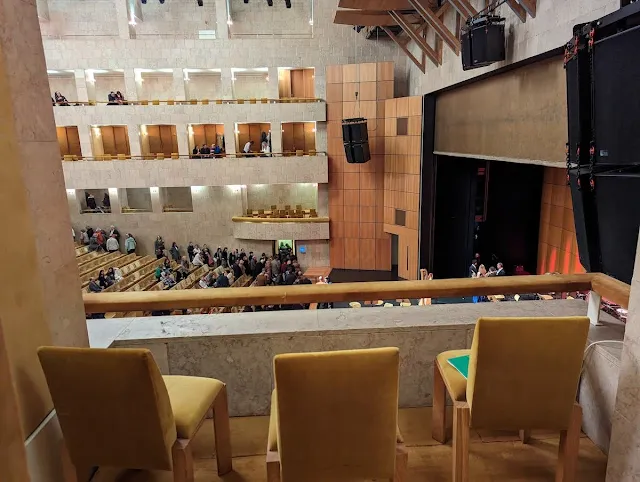
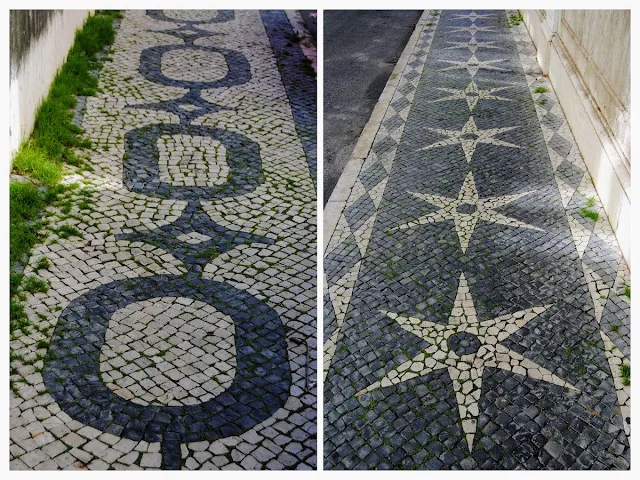
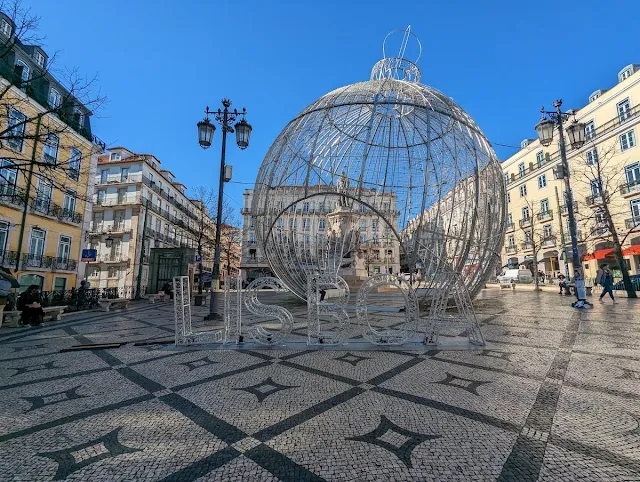

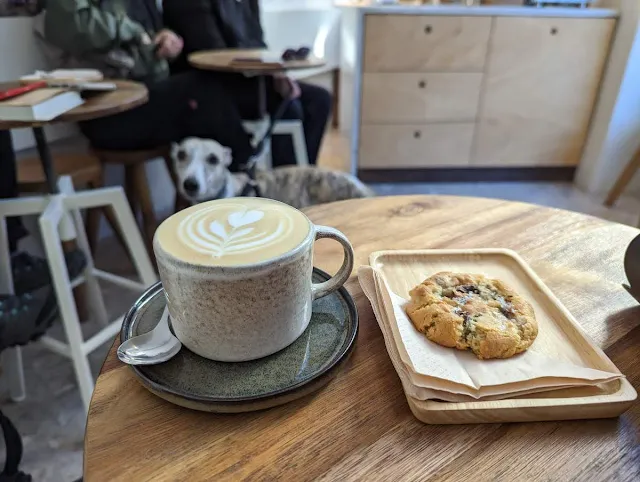


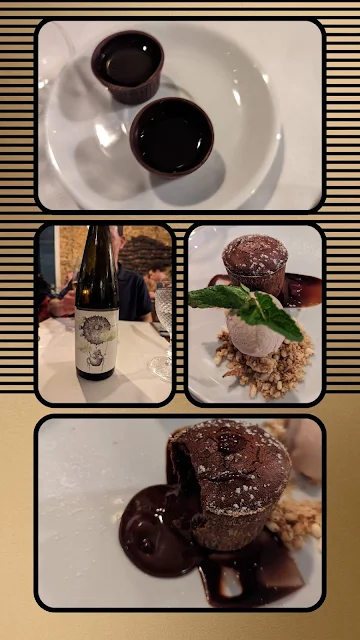
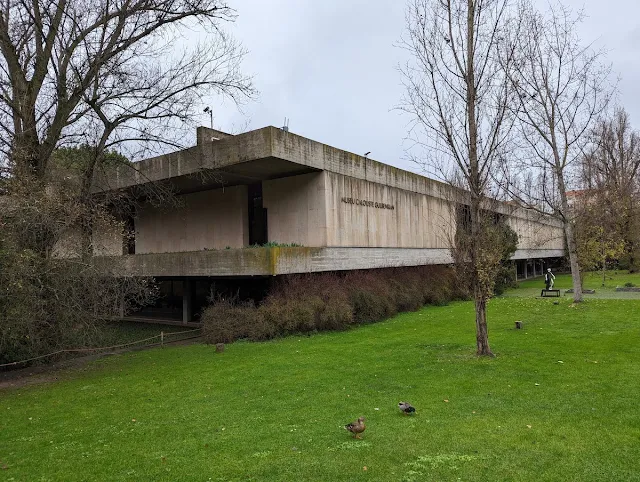

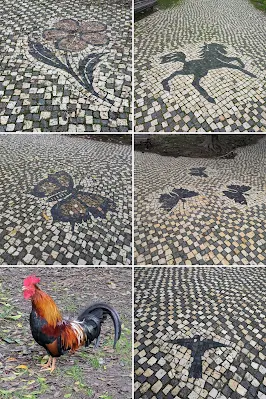



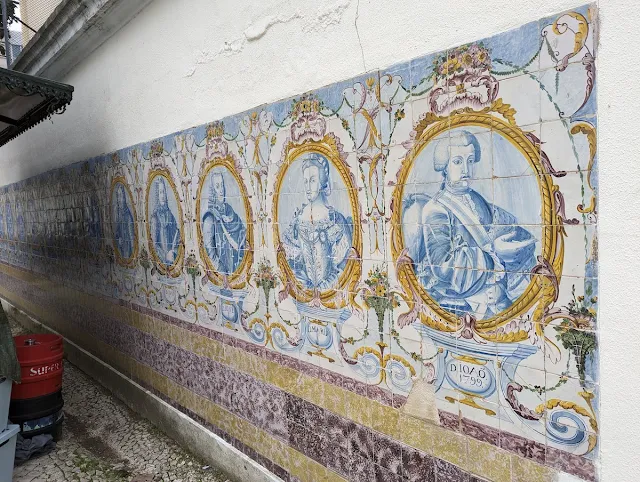

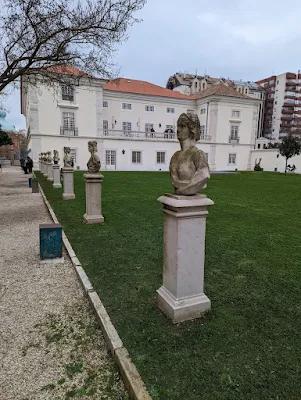
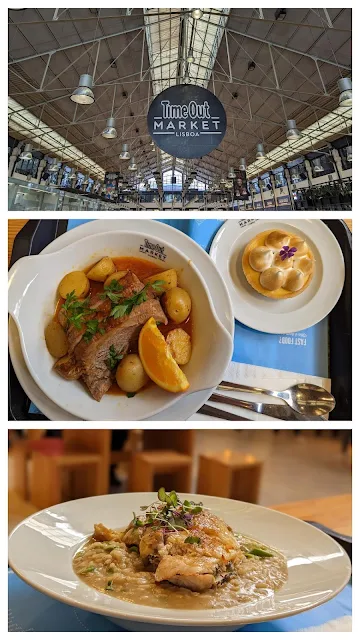




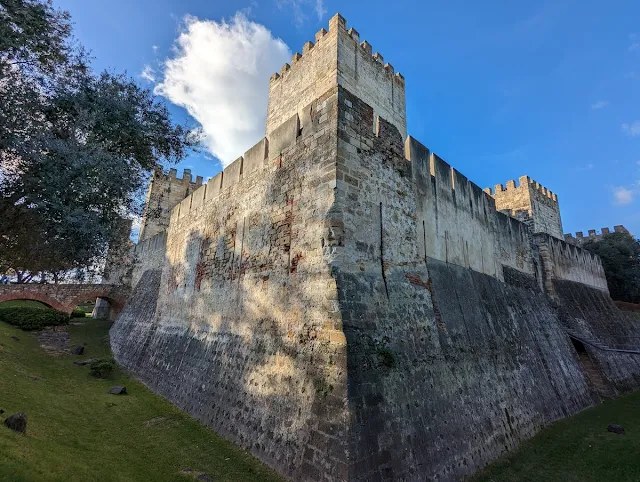

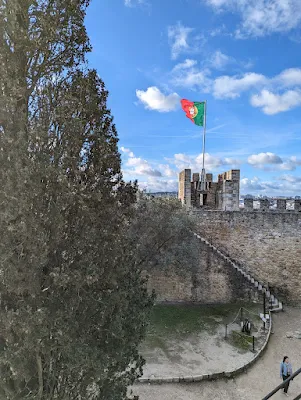
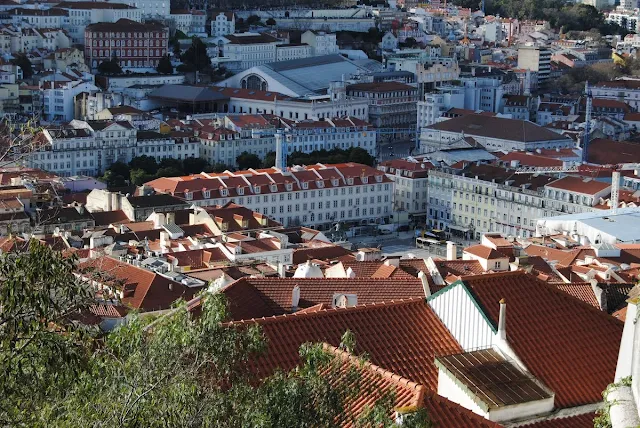


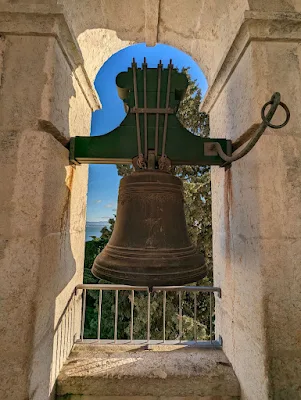
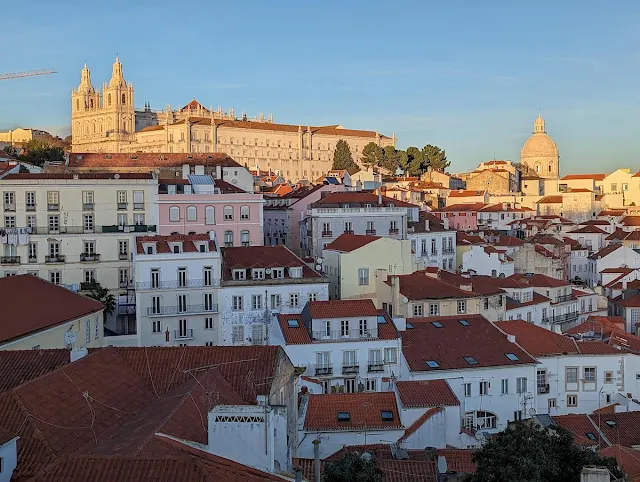




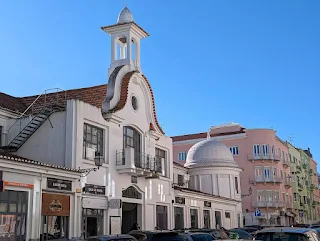



.jpg)
